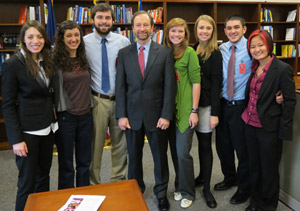Student-produced documentary debuts
Extending the Link examines Bosnia and Herzegovina
April 2, 2012
By Mike Killeen

Trang Pham and Katie Tomten kind of know how it feels when you get one of those impossible homework assignments - you know, read 140 pages and write a 10-page report by the next class period.
Their assignment? To find out how college-aged students in Bosnia and Herzegovina are moving the country forward following a civil war that tore the country apart.
The two College of Saint Benedict seniors are co-directors for this year's Extending the Link documentary, Obnova, which means "rebuilding" in English. The 30-minute film is set to debut at 7 p.m. Wednesday, April 18, at the Stephen B. Humphrey Theater, Saint John's University, and at 7 p.m. Thursday, April 19, at Pellegrene Auditorium, SJU.
It is the fifth documentary in as many years produced by Extending the Link, a non-profit, student-run venture through CSB and SJU and the Donald McNeely Center for Entrepreneurship. Previous student-produced documentaries were on fair-trade coffee in Guatemala, micro-lending in Chile, child-headed households in Uganda and the trafficking of women and children in Nepal.
This documentary, however, may be the most ambitious yet for Extending the Link.
Logistically, seven CSB and SJU students spent 20 days in late December through mid-January filming 50 hours of footage and interviewing approximately 30 people in three different cities in Bosnia and Herzegovina, a country located along the Adriatic Sea north and west of Greece.
"It was a little different from previous years, when the group would focus on one city," said Pham, a senior individualized major from Maple Grove, Minn. "This year, we were in three different cities, trying to look at three different views of different groups of people. So, it was a little more difficult."
Philosophically, they are dealing with an issue that is still - in many parts of Bosnia and Herzegovina - politically charged 17 years after a deadly civil war ended following the breakup of the country that was then known as Yugoslavia.
"This story is very convoluted and it gets very political," said Tomten, an art and French double-major from Stillwater, Minn. "That was one of the difficulties that we had while we were there. We didn't want to take any sides in the issue of the war or the genocide, and we didn't want to take a political stand in anything. By the nature of the conflict, it was very hard to remain kind of that fourth party, because there were the three ethnic groups (involved in the conflict). One of the difficulties we had to overcome was to make sure we're telling a story that doesn't fall into one of the three ethnic categories, and didn't seem biased toward one of them."
Instead, they focused on efforts made by two groups of people - those who were college-aged at the time of the civil war from 1992-95, and those who are now college-aged. Some of the people they interviewed were graduates of CSB and SJU who have moved back to Bosnia and Herzegovina to help their native country.
"We're focusing on the country moving forward ... the youth organizations and young adults in Bosnia and Herzegovina helping the country by getting more involved, by taking actions, by learning entrepreneurship, by doing a lot of positive things to advocate for the country, to bring the country forward," Pham said. "The war was what initiated this, and wanting to change the situation is what we're focusing on."
"The 'war generation' is really recognizing the power of the youth, and helping to facilitate opportunities for them to be able to take control, to take action in their own country and really bring about the change that they all seek," Tomten said.
When students and other members of the CSB and SJU communities see the finished documentary, both Pham and Tomten hope it raises awareness that small steps can have big, lasting effects.
"It's the inspiration of not being afraid to change something that's not right, and stepping up and making small changes that will become a big statement in the future and have a powerful impact to others," Pham said. "We don't want it to just be something like monetary support. We want it to be a much more powerful statement. That's what our documentary team has meant to do, to generate awareness of under-told global issues."
"We expect students to see the stories that we are presenting, and recognize that really there is no problem so huge that small changes can't have a snowball effect and really create change," Tomten added. "There are people out there who are making change and moving forward, and they're our age and maybe younger."
Copies of the documentary will be available to groups, schools, churches or organizations for showing after its debut at CSB and SJU. To reserve a copy, please contact Extending the Link.
